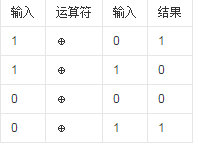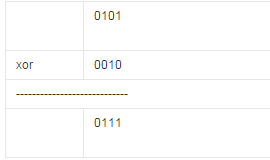_____异或运算_________________________2095_____________________________________________
1. a ⊕ a = 0 2. a ⊕ 0 = a 3. a ⊕ b = b ⊕ a 4. a ⊕b ⊕ c = a ⊕ (b ⊕ c) = (a ⊕ b) ⊕ c; 5. d = a ⊕ b ⊕ c 可以推出 a = d ⊕ b ⊕ c. 6. a ⊕ b ⊕ a = b. 7.若x是二进制数0101,y是二进制数1011 则x⊕y=1110 只有在两个比较的位不同时其结果是1,否则结果为0 即“两个输入相同时为0,不同则为1”!

现实中用的都是十进制的数值,那么我们来看一看两个十进制数值是怎么进行异或计算:
5 ⊕ 2 = ?
1.进行异或计算前会把数值都转换为二进制的:
5和2转为二进制分别为:0101 、0010

2.再把结果 0111 转换为十进制的:7
3.所以 5 ⊕ 2 = 7
巧用
与其它语言不同,C语言和C++语言的异或不用xor,而是用“^”,键入方式为Shift+6。(而其它语言的“^”一般表示乘方)
若需要交换两个变量的值,除了通常使用的借用中间变量进行交换外,还可以利用异或,仅使用两个变量进行交换,
a=a^b; b=b^a; a=a^b;
马老师 在 黑板上写过,....
现在步入正题 开始说 这一道题..____________________________________________
find your present (2) Time Limit: 2000/1000 MS (Java/Others) Memory Limit: 32768/32768 K (Java/Others) Total Submission(s): 19349 Accepted Submission(s): 7494 Problem Description In the new year party, everybody will get a "special present".Now it's your turn to get your special present, a lot of presents now putting on the desk, and only one of them will be yours.Each present has a card number on it, and your present's card number will be the one that different from all the others, and you can assume that only one number appear odd times.For example, there are 5 present, and their card numbers are 1, 2, 3, 2, 1.so your present will be the one with the card number of 3, because 3 is the number that different from all the others. Input The input file will consist of several cases. Each case will be presented by an integer n (1<=n<1000000, and n is odd) at first. Following that, n positive integers will be given in a line, all integers will smaller than 2^31. These numbers indicate the card numbers of the presents.n = 0 ends the input. Output For each case, output an integer in a line, which is the card number of your present. Sample Input 5 1 1 3 2 2 3 1 2 1 0 Sample Output 3 2 Hint Hint use scanf to avoid Time Limit Exceeded
#include<stdio.h> int main() { int n,a,m; while(scanf("%d",&n),n) { scanf("%d",&a); n--; while(n--) { scanf("%d",&m); a=a^m; } printf("%d\n",a); } return 0; }





